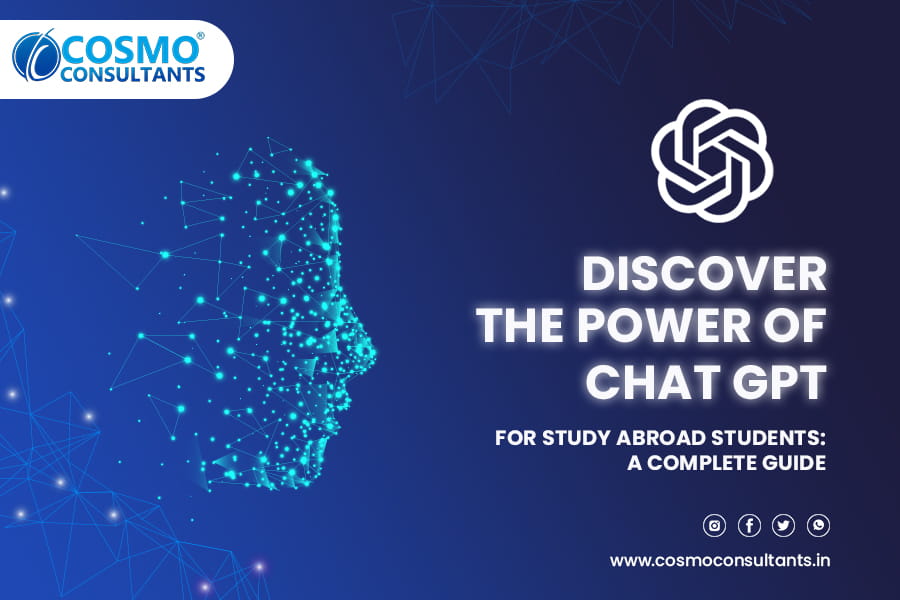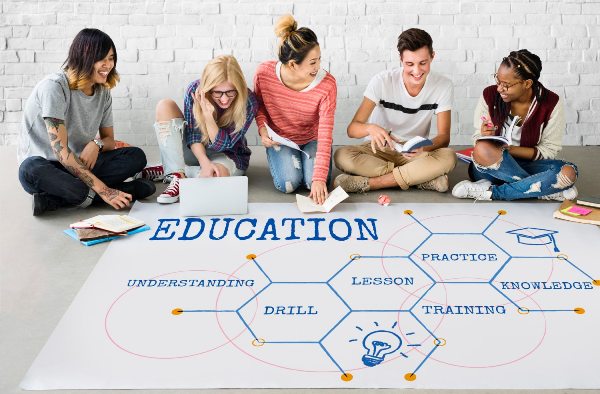
In recent years, the realm of education has witnessed a revolutionary shift with the integration
of artificial intelligence (AI) technologies. ChatGPT (Generative Pre-trained Transformer) is a
transformative AI-powered assistant that redefines the study abroad experience for students
globally.
Discover Chat GPT’s power for study abroad students – insights and practical
applications to enhance navigation, connection, and language skills, maximizing your study
abroad adventure.
ChatGPT is an advanced AI language model formed by OpenAI. It uses a special technology called
GPT (Generative Pre-trained Transformer) to create text that sounds like a human wrote it during
a conversation. The model learned patterns, structures, and context of natural language from a
large dataset of internet text.
ChatGPT has been widely used for various applications,
including chatbots, virtual assistants,
content generation, and language support systems. It aims to facilitate human-like interaction
and assist users in tasks that require natural language processing and generation.
Keep
in mind that ChatGPT’s text responses may not always be accurate or contextually
appropriate. Users should exercise critical thinking and verify information from reliable
sources when using AI-generated content.
ChatGPT utilizes a two-step process to generate text and engage in conversations. When a user interacts with ChatGPT by inputting a message or prompt, the model processes the text, considers the context, and generates a response. It aims to provide coherent and relevant replies based on its pre-trained knowledge and learned patterns.
ChatGPT, a powerful language model by OpenAI, offers numerous ways to enhance the studying experience and boost academic success. Here are the top 10 ways to utilize ChatGPT for effective studying:

Engage in conversation with ChatGPT to practice and improve your language skills. Use it as a virtual conversation partner to enhance your speaking, listening, and writing abilities.
Ask ChatGPT for study materials, tips, and recommendations related to your subjects. It can provide relevant articles, videos, and educational resources to support your learning.
If you come across a concept or topic that you find challenging, ask ChatGPT to explain it in a simplified manner. It can provide explanations and examples to help you better understand difficult concepts.
Seek ChatGPT’s assistance in creating a study schedule and planning your academic tasks. It can help you prioritize assignments, set goals, and manage your time effectively.
When working on projects or assignments, ask ChatGPT for research guidance. It can suggest reliable sources, provide background information, and assist in finding relevant studies or articles.
Use ChatGPT as a writing companion. Share your drafts or ideas with Chat GPT to receive suggestions for sentence structure, grammar, and vocabulary, enhancing your writing skills.
Prepare for exams and tests by quizzing yourself with the help of ChatGPT. Ask it to generate practice questions or provide explanations for challenging problems.
Take advantage of ChatGPT’s translation abilities. Use it to translate texts, phrases, or sentences to or from a target language, aiding your comprehension of foreign language materials.
When working on creative projects or essays, engage in a conversation with ChatGPT to generate ideas and explore different perspectives, in that case, it can inspire and help you brainstorm effectively.
ChatGPT can act as a study buddy, offering encouragement and motivation during challenging times.
Share your goals and aspirations with it, and it can provide uplifting messages to keep you
motivated.
While ChatGPT can help study, remember to verify the information and seek
guidance from educators or experts for complex or crucial subjects.
ChatGPT has the potential to greatly impact the field of overseas education by offering valuable
support and assistance to students.
In study abroad, Chat GPT offers a personalized AI
assistant to help students in new places,
connect with locals, and improve their language skills. The technology uses natural language
processing (NLP) to understand user input and generate appropriate responses.
Artificial
intelligence has the potential to revolutionize overseas education by providing
language practice, translation services, cultural insights, and round-the-clock support. It
enhances language skills, cultural adaptation, and overall study abroad experience by working
together with existing resources and human interactions.

While ChatGPT has many advantages for study abroad, there are also potential challenges and drawbacks to consider. Here are a few important considerations:
ChatGPT, being an AI language model, cannot fully replicate human interaction. While ChatGPT can assist with language practice, it may not match the nuanced communication, cultural understanding, and empathy of a human tutor or conversation partner. Students might miss out on interpersonal connections and cultural exchanges with native speakers or peers.
ChatGPT generates responses based on patterns and pre-existing data, which can result in inaccuracies or misinterpretations. It may not fully understand context or nuances, leading to incorrect translations, cultural misunderstandings, or misleading information. Students should exercise critical thinking and cross-reference information from reliable sources.
ChatGPT relies on technology, internet connectivity, and device accessibility. Technical issues, such as server downtime or connectivity problems, may hinder students’ access to the service when they need it. Additionally, depending solely on ChatGPT for language practice may limit students’ face-to-face interactions and their ability to adapt to various communication styles.
While ChatGPT can offer insights into cultural norms and practices, it cannot replace the immersive experience of living in a foreign country. Building authentic relationships, participating in cultural activities, and observing local customs firsthand are crucial aspects of studying abroad. Students should strive to engage directly with the local community to gain a deeper understanding of the culture and language.
Artificial Intelligence offers personalized study plans and recommendations, but it may not fully cater to individual learning styles, goals, or specific academic needs. Seek additional guidance from human advisors, language instructors, or study abroad consultants for tailored support and addressing unique requirements.
When using ChatGPT, consider privacy and data security as personal information may be stored or analyzed by the AI system. To overcome challenges, use Chat GPT with care, consult study abroad experts, practice speaking, immerse in local culture, and think critically with AI-generated content.
In conclusion, ChatGPT has had a significant impact on study abroad, offering both advantages and
disadvantages. It provides personalized support, improves language skills, and enhances the
study abroad experience. However, students should be mindful of privacy concerns and verify
information for accuracy.
By using Artificial Intelligence alongside human guidance, students can make the most of its
benefits while being aware of its limitations, ensuring a successful study abroad journey.
